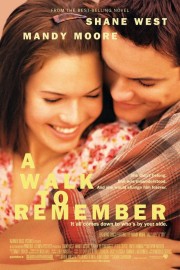A Walk to Remember
“I’ll take an earnest person over a hip person every time, because hip is short-term. Earnest is long-term.”- Randy Pausch, “The Last Lecture”
Few films have been as endearingly earnest as “A Walk to Remember,” from the novel by Nicholas Sparks (“The Notebook,” “Nights in Rodanthe”). But the first frames feel deceiving. It starts out like just another “hip” teen movie, with a popular alternative Gen-X song playing over the radio (that would be “Cannonball”), the “cool kids” being rebels without a cause, and a sharp moral line in the sand as they force someone- looking to be in the “in crowd”- to take a plunge from a great height (literally) only to be paralyzed when they hit the water. So far so formula.
But Adam Shankman, who’d previously directed “The Wedding Planner” (boo) and would go on to direct “Hairspray” (better), has a secret weapon, and that’s a screenplay by Karen Janszen that isn’t content to play things safe, let alone for maximum sap. Shankman and Janszen isn’t going to make any decisions easy for Landon Carter (Shane West), who’s estranged from his father and isn’t content to listen to his mother (Daryl Hannah, in a quietly touching performance under the rader). His principal has ideas to get him on the right track- like participating in the school play, and helping learning-challenged kids at their sister school- but Landon would rather hang out with his hipper-than-thou friends, including best friend Eric (Al Thompson) and Belinda (Lauren German), who has an unrequited crush on him.
Enter Jamie Sullivan (Mandy Moore), a plain-looking girl who’s the soloist in church hymns, a devout Christian, and is closer with her minister father (Peter Coyote) than she is with anyone at school. She volunteers on weekends, wears out-dated sweaters and dresses, yet walks with a confidence the cool kids- including Landon- find peculiar, mainly because they get their self-esteem from what others think of them, whereas Jamie finds hers from within herself. It’s in co-starring in the school play- a musical set in the Prohibition Era- where Jamie and Landon’s paths first cross. They eventually start meeting after school to run lines, but Jamie has one rule- “Don’t fall in love with me.”
You can probably figure out where things lead from there. What may ultimately elude you, however, is how smoothly the film moves across several possible minefields. It doesn’t get too sanctimonious for its’ own good (unlike the recent Christian-financed film “Fireproof,” though that film still resonates in its’ own way), nor does it get to one-dimensional in its’ portrayal of modern Christian believers. Anyone hoping for crass caricatures of the Evangelical faithful will be sorely disappointed- Moore (in a star turn that remains her most complete performance onscreen) and Coyote (in a thoughtful portrayal of a concerned parent and genuinely fearful servant of God) play it true to their characters, not allowing them to get overly preachy about their beliefs but to make their faith resonate from a lifetime of challenge and self-discovery. They feel more like the majority of real believers in this country, which stand in contrast to the politically-motivated “Christian Right” leaders we hear about in the news. This is one of the film’s many virtues, which in this context, isn’t a dirty word.
Another is how it portrays Landon’s transformation throughout the film, less a plot-driven necessity but a genuine effort towards being a better person (West plays this note-perfect, whether it’s in his gaining of Jamie’s trust or in his relationships with his father and friends). Again, for all its’ pluses, this is another area where this “Hollywood” effort trumps the church-funded “Fireproof.” West says it best in the film’s closing narration, when he says, “Jamie saved my life. She taught me everything. About life, hope and the long journey ahead…our love is like the wind. I can’t see it, but I can feel it.” In other words, there’s an effortlessness in the writing and performance that makes this film feel true-to-life. Everyone involved gives their heart to making this work, and it can be felt in every moment.
Music plays a big role in this film, not surprising since its’ star began her career as a teen pop star (with arguably more talent than Christina, Britney, and Jessica combined). Along with the three solo songs she contributes to the soundtrack- the single “Cry,” the pop ballad “It’s Gonna Be Love,” and the movie’s love theme “Only Hope”- she also reportedly brought onto the project the Christian band Switchfoot, whose songs (“Dare You to Move,” “You,” and their own version of “Only Hope,” which is arguably better than Moore’s) bring another kind of emotion to the film different than Moore’s contributions. Her and Switchfoot lead singer Jonathan Foreman also have a duet (“Someday We’ll Know”), but it’s a rather unnecessary addition to a soundtrack that already carries with it so much heart and pop soul, especially in conjunction with Mervyn Warren’s beautifully subtle and touching orchestral score. “A Walk to Remember” is far from perfect- can you say sappy- but it’s a film that is unafraid to be unabashedly sincere and maybe even a little old-fashioned. I’m not afraid of saying this, but in this era of movies, that’s never a bad thing for a film to be.










